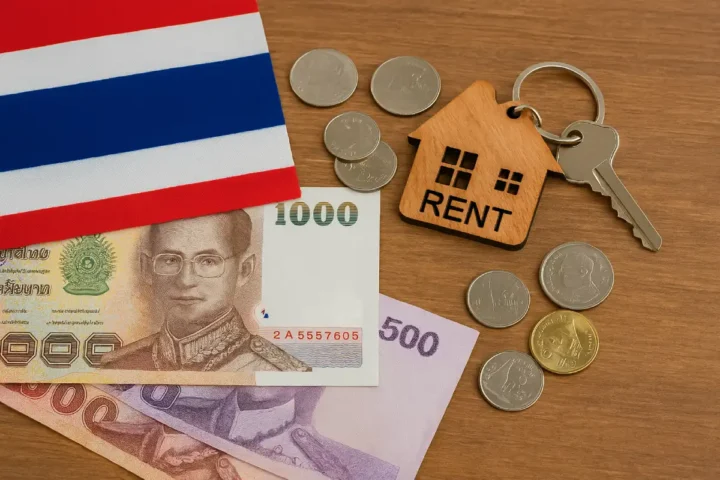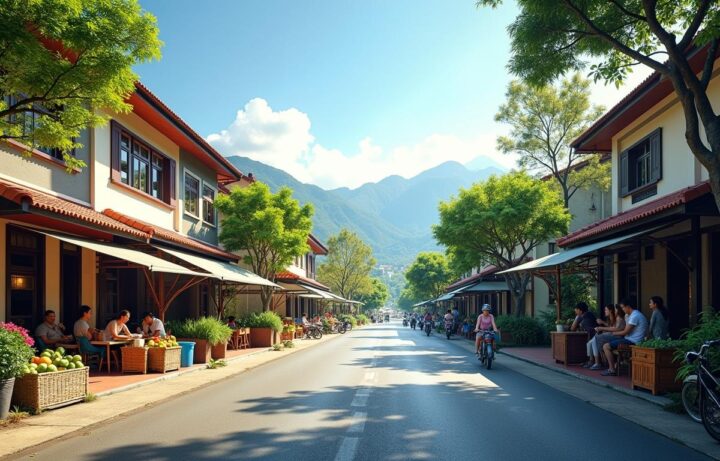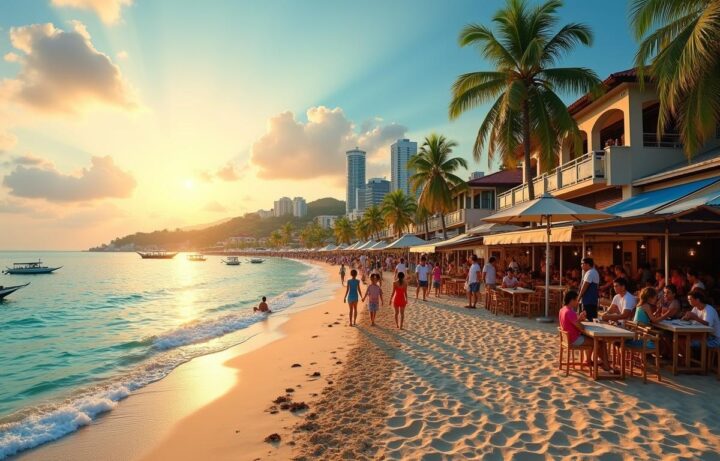Average Cost of Living in Thailand: Comparison of Top Cities
Choosing to live in “The Land of Smiles” comes with a major financial advantage, as the average cost of living in Thailand is about 47.3% lower than in the United States. A family of four can live comfortably on around $2,146 per month excluding rent, while a single person enjoys an affordable lifestyle at about $604 monthly.

Living costs vary by a lot depending on where you settle in Thailand. Bangkok residents spend around $941 monthly, but life in Chiang Mai costs less at $691. The comparison between Thailand and US becomes even more appealing with rent prices that are 69.2% lower than American cities. People often ask about Thailand’s living expenses – most residents spend between $700 to $2,000 each month based on their lifestyle and location choice.
This piece breaks down living costs in Thailand’s popular cities. You’ll find everything about expenses from housing to daily needs that will help you plan your move to this vibrant Southeast Asian country better.
Understanding the Average Cost of Living in Thailand
Thailand blends affordable living with exotic experiences that attract travelers, expats, and digital nomads. Living costs here create an appealing alternative to Western economies, with savings possible in almost every category.
How Thailand compares to Western countries
The cost differences between Thailand and Western nations are a big deal. Thailand costs 47.3% less than the United States without including rent. Housing prices here are remarkably lower, with rent averaging 69.2% below US rates. The gap shows up in daily costs too – US restaurant prices soar 207.2% higher than Thai ones, while groceries cost 75.4% more.
Money savings become crystal clear with specific examples. A basic Thai restaurant meal runs about $1.68-$2.06, unlike the $20 you’d pay in America. Getting around costs 55.5% less than in the US, which makes daily travel in Bangkok and Chiang Mai much easier on your wallet.
The actual numbers in Thailand look like this: a family of four needs around $2,146 (71,835 baht) monthly without rent. A single person can get by with about $604 (20,231 baht).
Factors affecting your personal expenses
Your living costs in Thailand depend on several things. Location matters – life in Chiang Mai costs 31% less than Bangkok, which means real savings if you head north from the capital.
Housing makes a huge difference in your budget. Bangkok’s city center apartments cost about 16,079 baht monthly, while similar places outside drop to 8,901 baht. Luxury seekers can find high-end condos with infinity pools and sky decks for around 300,000 baht monthly.
Your lifestyle choices shape your spending too. Local Thai food instead of Western dishes can cut food costs by 70%. Public transport starting at 20 baht per ride saves way more than taxis or rental cars.
A single person’s costs vary based on these choices. People who embrace local ways live well on 30,000-40,000 baht ($850-1,130) monthly. Western lifestyle fans might need quite a bit more.
The digital nomad advantage
Digital nomads find Thailand particularly attractive. Remote workers earning in stronger currencies often live comfortably while spending nowhere near what they would back home. A good life here typically costs $1,500-2,000 monthly.
Moving around freely adds another plus. Many nomads start in beautiful Phuket, move through Bangkok’s urban scene, and end up in budget-friendly Chiang Mai with its 20-year-old expat community. Coastal spots like Pattaya and Krabi offer comfortable living for $1,200-1,600 monthly.
The perks include affordable co-working spaces (3,000-7,200 baht monthly), reliable internet (800-1,200 baht monthly for high-speed), and great chances to meet fellow retirees and digital nomads.
This financial freedom lets digital professionals work less while enjoying luxuries they couldn’t afford at home. Weekly massages, regular dining out, and weekend trips in a variety of Thai landscapes become part of everyday life.

First Month Expenses: Getting Settled
The first month in Thailand comes with its own set of expenses that go beyond regular monthly living costs. You need to plan your budget carefully to handle any surprise costs while settling in.
Accommodation options for new arrivals
Finding the right place to stay is your first step to living in Thailand. New arrivals have several temporary options while they look for a permanent home. Hostels are the cheapest choice – shared dorms start at ?400 per night, and private rooms cost about twice as much. Small family-run guesthouses start around ?500-600 per night and throw in extras like breakfast and bikes.
Serviced apartments are a great deal if you’re staying more than a week. They start at ?1,000-1,500 per night and include housekeeping and utilities. Many digital nomads and expats pick this option as they explore areas like Chiang Mai or Bangkok.
Long-term housing prices vary based on where you live. A one-bedroom apartment in central Bangkok costs about ?16,079 monthly, while similar places outside the center run around ?8,901. Phuket has beachside condos from ?15,000 monthly, and Chiang Mai offers even better deals with studio condos starting at ?10,000 monthly.
Transportation from airport to Bangkok and beyond
Getting from the airport to your destination is your first travel expense. Regular taxis from Suvarnabhumi Airport to Bangkok cost ?300-500 plus toll fees. Private airport transfers are another option, starting at ?17.35 for small groups (3 passengers).
Heading straight to other areas? Airport transfers to Pattaya range from ?36.65-60.85 depending on group size. Transfers to Krabi or other beach destinations cost more but save hassle after a long flight.
Daily transportation stays affordable once you’re settled. Public transportation passes cost around ?1,083 monthly, and owning a motorbike runs about ?500-2,000 monthly.
Essential setup costs
The first month brings several one-time expenses you’ll need to cover. Here’s what you should budget for:
Mobile plans with calls and 10GB+ data run about ?453.52 monthly. Internet setup for 60 Mbps or faster service costs around ?575.97 monthly. You’ll also need money for household items if your place isn’t fully furnished.
Retirees planning to stay longer should think about health insurance. Basic coverage in Thailand starts at ?20,000 yearly, while complete plans begin around ?400 per year if you’re healthy.
Visa considerations and fees
Visa costs are a vital part of comparing Thai and US living expenses. Tourist visas cost about $40 (?1,400) and let you stay up to 60 days, with possible 30-day extensions. Long-term visitors should add visa extension fees of ?1,900 to their budget.
Non-immigrant retirement visas need proof of finances – either ?800,000 ($22,800) in a Thai bank or monthly income over ?65,000 ($1,850). The new Long-Term Resident visa costs ?50,000 and gives you up to 10 years with tax benefits.
Visa processing takes about 15 business days. These visas stay valid for 90 days, so it’s best to apply about a month before you leave.
Monthly Budget Breakdown by City
The sort of thing I love about Thailand is how living costs differ between popular destinations. My years as a digital nomad have taught me that your choice of city will substantially affect your monthly budget.
Phuket: Island living costs
Phuket demands the highest budget among Thailand’s popular destinations. A single person needs about 670.9$ (22,456?) monthly without rent, and a family of four spends roughly 2,348$ (78,622?). Rental prices vary widely – a furnished one-bedroom apartment in premium areas costs around 28,555? monthly, while normal areas run about 14,494?. One person’s utilities typically cost 4,451? monthly. People talk about living in Phuket for 1,000 USD, but most folks need about 1,500 USD per person monthly to live comfortably.
Bangkok: Urban convenience pricing
Thailand’s capital blends convenience with a higher cost of living. A family of four in Bangkok spends around 2,325$ (77,853?) monthly without rent, while singles need about 655$ (21,939?). City center one-bedroom apartments cost 26,744? monthly on average, dropping to 13,569? in regular areas. Studio apartment utilities are quite cheap at 1,849? monthly. Expats flock here since the average monthly net salary of 25,420? makes it cheaper than Western countries while offering urban perks.
Chiang Mai: Northern budget haven
Chiang Mai stands out as Thailand’s most affordable spot for singles. Monthly costs without rent run about 525$ (17,583?) for singles and 1,852$ (61,991?) for families. City center one-bedroom apartments average just 13,657? monthly, while outer areas cost only 7,343?. This northern city draws many digital nomads and retiree groups who want both comfort and value. Locals say singles can live well on 30,000? (1,000$) monthly, while families need around 60,000? (2,000$).
Pattaya and Krabi: Coastal living expenses
Pattaya offers a mid-range coastal lifestyle costing 583$ (19,530?) monthly for singles and 2,069$ (69,283?) for families, without rent. City center one-bedroom condos and apartments average 18,464? monthly, with outer areas at 10,763?. Krabi matches this value with expat monthly expenses averaging 1,046$. Thailand’s coastal living costs vary quite a bit, and Krabi’s city center one-bedroom apartments average 17,333? monthly.

How Lifestyle Choices Impact Your Thailand Budget
Your everyday choices can really shape how much you’ll spend living in Thailand. I’ve lived in Chiang Mai, Bangkok, and Phuket while running stophavingaboringlife.com, and I’ve found that lifestyle choices can make or break your budget.
Local vs. Western food costs
You can cut your living costs in Thailand by eating local food. Street vendors sell tasty Thai meals for just 30-60 baht ($1-2), so you can save thousands each month. Local restaurants serve meals between 100-300 baht ($3-10), which is still a great deal.
Western dining hits your wallet harder. These restaurants usually charge 300-900 baht ($10-30) per meal, and imported foods like cheese cost about $6.60 for half a pound. Note that most Thai people eat out every night because local food is so cheap.
The price gap really shows in Bangkok, where street food runs 40-100 baht ($1-3), but fancy restaurants can charge 2,000+ baht ($60+) per person.
Transportation options and their price differences
Public transport helps you save money in Thailand. The BTS Skytrain and MRT subway in Bangkok cost between 16-59 baht ($0.45-1.75) per ride. Monthly passes are available for 1,000-1,500 baht ($30-43).
Motorcycle taxis charge 20-100 baht based on how far you go, while tuk-tuks just need 80-150 baht for similar trips. Regular taxis start at 35 baht and add 2 baht per kilometer.
Busses are your best bet for traveling between cities—a trip from Bangkok to Krabi costs about 400-700 baht.
Entertainment and social activities
Entertainment costs vary a lot in Thailand. Temple visits cost 30-150 baht ($1-5), and national parks charge 150-300 baht ($5-10).
Adventure activities in Pattaya and Krabi cost more—scuba diving ranges from 900-3,000 baht ($30-100). A full night out in Bangkok with dinner, drinks and club entry runs about $30-50.
Expats and retirees often spend around $400 extra monthly on small trips and “stay-cations”. Thai massages remain affordable at 250-400 baht ($10) per hour.
Seasonal Cost Variations Across Thailand
Living costs in Thailand change a lot through the year. This creates challenges and gives budget travelers new ways to save money. My extensive travels across the country taught me how timing affects your spending.
High season vs. low season pricing
Thailand gets more expensive during high season from November to February. The perfect weather brings tourist crowds during this time. Hotel rates on islands like Phuket and coastal spots like Krabi jump up by 50%. The Christmas-New Year period is peak season. Hotel prices shoot up and rooms become hard to find. The low season from May through October tells a different story. You can save 30-50% across most places.
Best times to book accommodation
Smart timing helps single travelers find the best deals in Thailand. Hotels give rooms to discount bookers about three months ahead. This makes it the best time to lock in good rates. The biggest savings come during July-September. Room rates drop by half during this off-season. Bangkok hotels keep steadier prices year-round. This differs from Chiang Mai and beach destinations where prices swing with seasons. Many expats and retirees plan their longer stays around these bargain periods.
Weather considerations and utility costs
Weather shapes your utility budget in Thailand. Air conditioning pushes up electricity bills in hot months. These can reach 3000-3500 THB monthly. Your total living costs include these seasonal expense spikes. Living costs stay lower than the US throughout the year. Yet utility bills climb higher in the hot season.
Currency changes play a role too. The Thai baht might weaken to 37 per dollar during second quarter dividend payments. Pattaya and other coastal areas get humid in rainy season. The upside is much lower housing costs. This creates a great chance for budget-conscious long-term visitors.
Cost of Living in Thailand Frequently Asked Questions
What is the most affordable city to live in Thailand?
Chiang Mai is widely considered the most budget-friendly city in Thailand. It offers a slower pace of life, cooler climate, and lower costs for accommodation, food, and entertainment compared to larger cities like Bangkok.
How much does it cost to live comfortably in Thailand per month?
The cost of living in Thailand typically ranges from $700 to $2,000 per month, depending on your lifestyle and location. This budget can cover accommodation, food, transportation, and entertainment in most Thai cities.
Is $3,000 a month enough to live well in Thailand?
Yes, $3,000 a month is more than enough to live comfortably in Thailand. This budget allows for a spacious apartment, frequent dining out, entertainment, and even some travel within the country.
How do seasonal changes affect the cost of living in Thailand?
Prices in Thailand fluctuate seasonally, especially in tourist areas. High season (November to February) can see accommodation costs rise by up to 50%, while the low season (May to October) offers significant savings of 30-50% on many expenses.
What are some ways to reduce living costs in Thailand?
To lower your expenses in Thailand, consider embracing local cuisine, using public transportation, living in less touristy areas, and timing your visit during the low season. Additionally, adopting more local lifestyle habits can significantly reduce your overall cost of living.
What is the overall cost of living in Thailand compared to the US?
Thailand is generally much more affordable than the US, especially when it comes to housing, food, and transportation. Major cities like Bangkok can be pricier, but still less than most US cities. Smaller cities and rural areas offer even greater savings for daily expenses.
Which Thai city is the most expensive to live in?
Bangkok is the most expensive city in Thailand, largely due to higher rent and lifestyle costs. However, it still offers good value compared to big cities in the US. Upscale neighborhoods and international amenities can increase costs, but budget options are widely available.
Are healthcare costs in Thailand affordable for expats?
Yes, healthcare in Thailand is known for being both high-quality and affordable. Many expats choose private hospitals for faster service, which are still much cheaper than in the US. Health insurance is recommended, but even out-of-pocket costs are reasonable.
How do transportation costs vary between Thai cities?
Public transportation in Thailand is very affordable, especially in cities like Bangkok with extensive train and bus networks. Smaller cities rely more on motorbikes and songthaews, which are also budget-friendly. Ride-hailing apps are popular and cost much less than in the US.
Is dining out in Thailand cheaper than cooking at home?
Dining out in Thailand is often as cheap or cheaper than cooking at home. Street food and local restaurants offer delicious meals at low prices. Western-style restaurants and imported groceries will cost more, but local options make it easy to save money.


